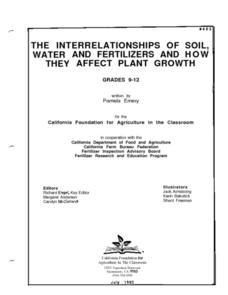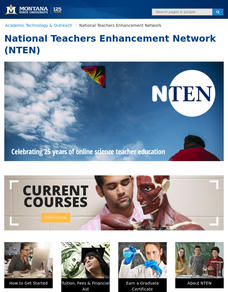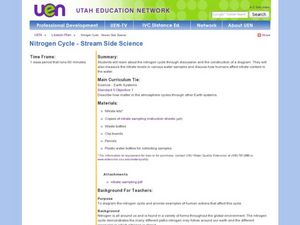University of Richmond
The Forced Migration of Enslaved People 1810-1860
Slavery not only involved the forced migration of African people from their homes, it also meant the forced removal of people within the United States. Using data and interactive graphics, scholars see how the tragedy of human slavery...
Curated OER
The Interrelationships of Soil, Water and Fertilizers and How They Affect Plant Growth
Students examine how different nutrients in the soil and fertilizers affect plant growth. In groups, they participate in a role play in which allows them to see the interactions of humans and plants. They also read articles and record...
Curated OER
Salt Marsh in a Pan
Students create a model of a salt marsh to discover the impact of pollution and human activities on water-based habitats including bays and the ocean. They recognize the relationship between natural and developed areas. Students impact...
Curated OER
Week 3: Pollution Source and Effects
Lab groups set up an experiment to observe what happens over time in collected pond water when fertilizer, representing pollution, is added. This website does not include student lab sheets, but background information, materials, and...
Curated OER
Composting
Using 2-liter bottles, junior ecologists create composting tubes in which they place nitrogen-rich and carbon-rich materials. They observe what changes occur over two weeks' time. Provide more specific direction to your class as to what...
California Academy of Science
Human Evolution
As the great and hilarious Tim Minchin once said, "Science is simply the word we use to describe a method of organizing our curiosity." Science is more than just a guess; it is based on questions, observations, and evidence. High...
Curated OER
Zebrafish Development
Middle schoolers examine the early development of zebrafish as a model for embryo development in humans. They observe various stages of zebrafish reproduction from sperm and eggs to fertilized eggs and hatchlings.
Curated OER
Eutrophication Lab
Middle schoolers examine the effects of detergents and fertilizers on aquatic life and describe algae. Students define the term eutrophication as the process by which a body of water, such as a pond, lake, stream, or river, has a sudden...
Curated OER
The Effects of "Recreational" Drugs on the Development of Chick Embryos as a Model for Human Embryogenesis
Young scholars conduct experiments on fertilized chicken embryos to determine the possible developmental effects that various recreational drugs (caffeine, alcohol, nicotine, and aspirin) might have on them.
Curated OER
Fertilizers, Pesticides and Human Health
High schoolers define several vocabulary terms related to chemicals and toxicology. Students calculate chemical concentrations in water and explain the toxicological principles that govern safety of substances. High schoolers conduct an...
Curated OER
Human Embryonic Stem Cells
Students use the Internet to discover information about human embryonic stem cells from the National Institutes of Health. They examine different sides of the debate to use or not to use stem cells. They can also listen to speeches given...
Curated OER
We've Come a Long Way, Baby!
Students study technology and the different reproductive technologies available today. In this human reproductive technology instructional activity students describe how engineers create technologies to improve the health of mothers and...
Curated OER
What Happens in the First Nine Months?
Young scholars identify their feelings and learn constructive ways of handling conflict. In this conflict lesson students discuss their feelings and when they are feeling a certain way what they can do to remedy the situation.
LABScI
Genetic Equilibrium: Human Diversity
Investigate the Hardy-Weinberg Principle to explain genetic equilibrium. The 10th lesson plan of a series of 12 is a laboratory exploration of genetic equilibrium. Your classes use a mixture of beans to model allele and genotype...
Curated OER
Human Ecology: How it Relates to Population
Ninth graders are introduced to the concept of population. In groups, they research the problems associated with overpopulation and underpopulation. They practice calculating birth and death rates and discus how they can be used to...
Curated OER
Demonstrating Erosion in Action
Students easure and record volume of water, then measure and record mass of soil. They explain the effects of the following in controlling erosion: Contouring, cover crop, strip cropping, reforestation, inter-seeding.
Curated OER
Assisted Reproduction
Students are actively involved in presenting some of the issues in implanting previously frozen embryos through a cooperative learning lesson. This lesson helps students to develop decision-making skills through discussing various types...
Curated OER
Water Pollution
Fifth graders study the impact of human activity on water quality and on the ecosystems of Earth. After a discussion on the various ways that water can be polluted, groups of youngsters get together to figure out the best way to clean a...
Curated OER
Sustainable Livestock
Young scholars investigate healthy eating habits by researching livestock. In this food sustainability instructional activity, students research the negative impact factory farming has on our environment due to pollution. Young scholars...
Curated OER
Water Pollution
Here is a fine lesson for fifth graders that will give them an idea of the variety of impacts that human-introduced pollutants have on the environment. After an initial class discussion and teacher-led demonstration, pupils brainstorm...
Curated OER
Nitrogen Cycle-Stream Side Science
A thorough background and nitrate sampling lab sheet are provided to share with your young scientists. After discussing the nitrogen cycle with the class, you will break them into small groups and show them how to use their inquiry...
Curated OER
Erosion
Fifth graders engage in some activities that will help them to identify erosion and explain the causes of erosion. They also look into ways that humans can slow the process of erosion in some cases. After a teacher-led demonstration,...
Curated OER
How Toxic Is It?
Students participate in an activity in which they investigate the scientific method and seed germination as well as practice graphing and metric measuring skills. Students examine toxicity by exposing Wisconsin Fast Plants seeds to toxic...
Curated OER
Change Since 1609
Students recognize how the climate of the Hudson Valley has changed since the last glaciation. They explain these changes using a reconstruction of the land use changes in the Hudson Valley composed of confetti, Ziploc bags and other...

























